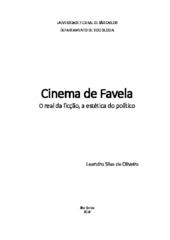Mostrar el registro sencillo del ítem
Cinema de Favela, o real da ficção, a estética do político
| dc.contributor.author | Oliveira, Leandro Silva de | |
| dc.date.accessioned | 2019-07-30T16:24:30Z | |
| dc.date.available | 2019-07-30T16:24:30Z | |
| dc.date.issued | 2018-07-04 | |
| dc.identifier.citation | OLIVEIRA, Leandro Silva de. Cinema de Favela, o real da ficção, a estética do político. 2018. Tese (Doutorado em Sociologia) – Universidade Federal de São Carlos, São Carlos, 2018. Disponível em: https://repositorio.ufscar.br/handle/ufscar/11561. | * |
| dc.identifier.uri | https://repositorio.ufscar.br/handle/ufscar/11561 | |
| dc.description.abstract | Contemporary Brazilian cinema, particularly the one committed to revisiting the urban periphery, ends up refreshing some aspects of relation between the film and the social context, aesthetics and politics, theme and form, between fiction and reality. And in doing so, it maintains an already long-standing background dialogue which has privileged sociology and anthropology as interlocutors. That said, three orders of problems guide the theoretical-analytical fabulation that I develop. The first is the problem of fiction as a space of conformation for certain phenomenological ambiguities and the articulations that follows; how certain exteriorities are internalized in the film in a blurring between the fictional and the nonfictional, the discursive and the empirical. Next, I investigate how the social sciences tradition and practice (in dialogue with documentary aesthetics) are mobilized as epistemological models and referent of privileged access to the real. The third is the problem of the real itself as a raw material on which the discourses are based, of the real as a value, and communicating with an argumentative vocation of the film, of diegesis as a corpus and narrative as a thesis. I start, therefore, from the form, from the level of the meaning of the cinematographic device properly, so as to reconstitute the bonds, affinities and assumptions of engagement of the film with the real 'in' and 'out'. In the first part of the thesis I present a theoretical-methodological and historical-conceptual approach to these impasses. Thereafter I propose five essays about five films that are quite different from each other, but which share the gravitation around the themes of urban periphery, poverty and violence in Brazil: Cidade de Deus (2002), Linha de passe (2008), Tropa de Elite e Tropa de Elite 2: O inimigo agora é outro (2007 e 2010), O som ao redor (2013) e Branco sai, preto fica (2014). | eng |
| dc.description.sponsorship | Coordenação de Aperfeiçoamento de Pessoal de Nível Superior (CAPES) | por |
| dc.language.iso | por | por |
| dc.publisher | Universidade Federal de São Carlos | por |
| dc.rights.uri | Acesso aberto | por |
| dc.subject | Cinema | por |
| dc.subject | Real | por |
| dc.subject | Favela | por |
| dc.subject | Cidade | por |
| dc.subject | Verdade | por |
| dc.subject | City | eng |
| dc.subject | Truth | eng |
| dc.subject | Ciudad | spa |
| dc.title | Cinema de Favela, o real da ficção, a estética do político | por |
| dc.title.alternative | Favela Movie, the real of fiction, the aesthetics of politics | eng |
| dc.type | Tese | por |
| dc.contributor.advisor1 | Rizek, Cibele Saliba | |
| dc.contributor.advisor1Lattes | http://lattes.cnpq.br/0540870380815135 | por |
| dc.description.resumo | O cinema brasileiro contemporâneo, particularmente aquele empenhado numa revisita à periferia, finda por atualizar alguns aspectos do trânsito entre o filme e o contexto social, entre estética e política, tema e forma, entre ficção e realidade. E, ao fazê-lo, sobreleva um já longo diálogo de fundo que tem na sociologia e na antropologia interlocutores privilegiados. Isto posto, três ordens de problemas servem de horizonte para a fabulação teórico-analítica que desenvolvo. O primeiro é o problema da ficção como espaço de conformação para certas ambiguidades fenomenológicas e as articulações que daí se depreendem, i. e., como certas exterioridades são internalizadas, no filme, num embaçamento entre o ficcional e o não ficcional, o discursivo e a empiria. Por outro lado, investigo de que maneira a tradição e expedientes das Ciências Sociais (em diálogo com a estética documentário) são mobilizados como modelos epistemológicos e referentes de acesso privilegiado ao real. O terceiro é o problema do próprio real como matéria prima da qual se servem os discursos, do real como valor, e que se comunicam com uma vocação dissertativa do filme, da diegese como corpus e da narrativa como thésis. Parto, portanto, da forma, do nível da significação do dispositivo propriamente cinematográfico, para, daí reconstituir os vínculos, afinidades e pressupostos de engajamento do filme com o real ‘para dentro’ e ‘para fora’. Introduzo uma abordagem teórico-metodológica e histórico-conceitual nas primeiras páginas e, em seguida, proponho cinco ensaios sobre cinco filmes bastante diferentes entre si, mas que têm em comum a gravitação em torno dos temas da periferia urbana, da pobreza e da violência no Brasil: Cidade de Deus (2002), Linha de passe (2008), Tropa de Elite e Tropa de Elite 2: O inimigo agora é outro (2007 e 2010) , O som ao redor (2013) e Branco sai, preto fica (2014). | por |
| dc.publisher.initials | UFSCar | por |
| dc.publisher.program | Programa de Pós-Graduação em Sociologia - PPGS | por |
| dc.subject.cnpq | LINGUISTICA, LETRAS E ARTES::ARTES::CINEMA | por |
| dc.subject.cnpq | LINGUISTICA, LETRAS E ARTES::ARTES::CINEMA::INTERPRETACAO CINEMATOGRAFICA | por |
| dc.subject.cnpq | CIENCIAS HUMANAS::SOCIOLOGIA::OUTRAS SOCIOLOGIAS ESPECIFICAS | por |
| dc.subject.cnpq | CIENCIAS HUMANAS::SOCIOLOGIA::SOCIOLOGIA URBANA | por |
| dc.ufscar.embargo | Online | por |
| dc.publisher.address | Câmpus São Carlos | por |
| dc.contributor.authorlattes | http://lattes.cnpq.br/4781986347742383 | por |
